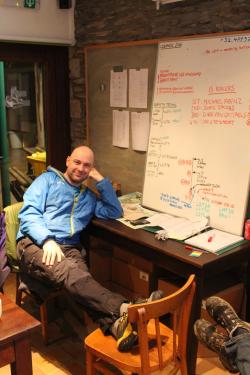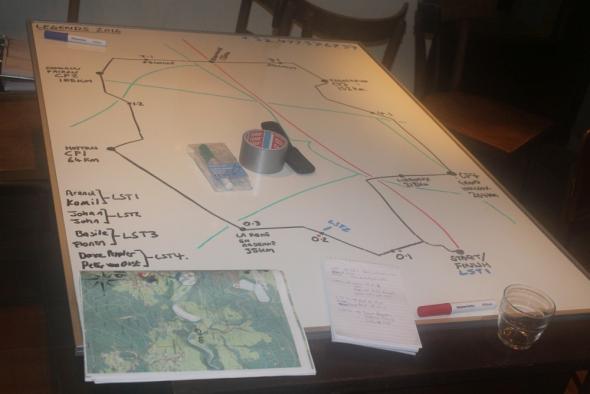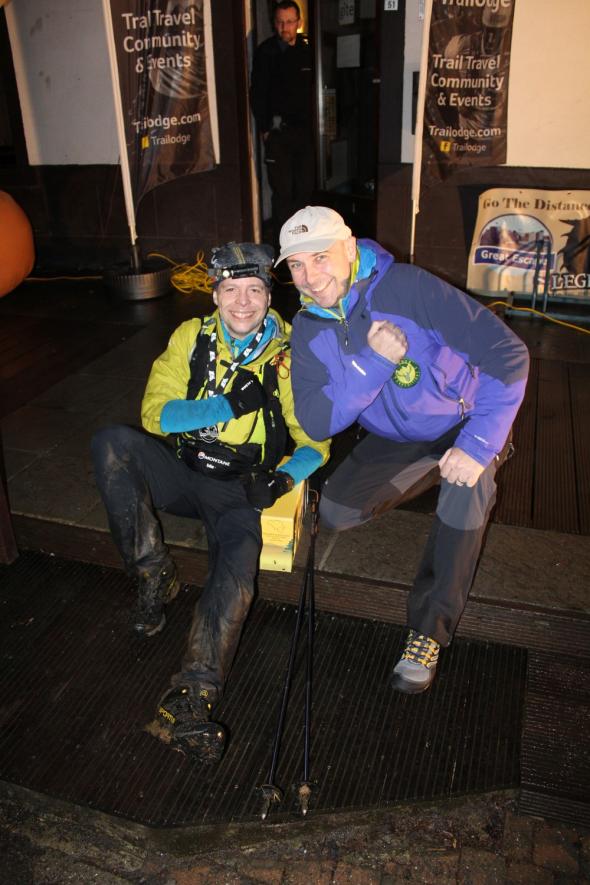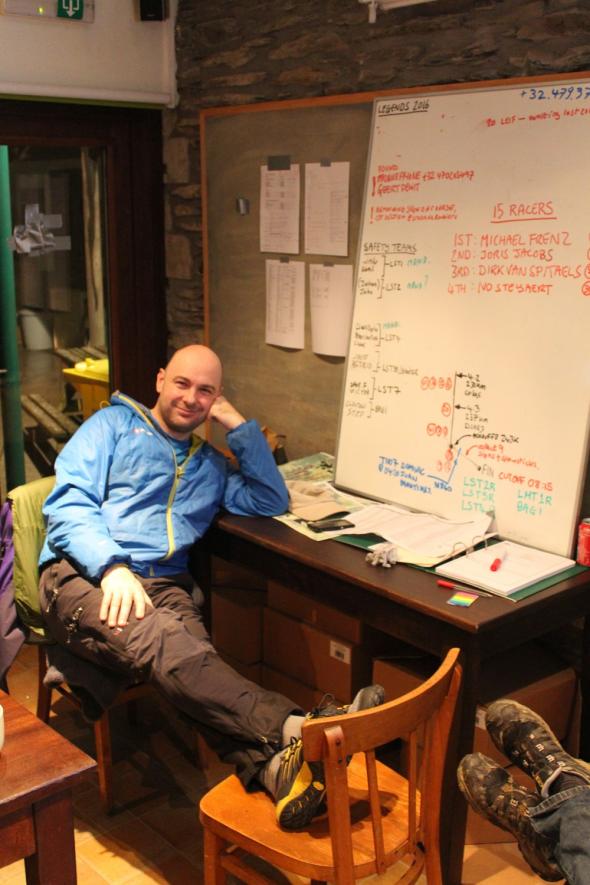
Stu Westfield to angielski przewodnik górski i koordynator bezpieczeństwa ekstremalnie długich ultramaratonów The Spine Race (431 km w północnej Anglii) i Legends Trails (250 km w belgijskich Ardenach). Rozmawialiśmy 7 marca, tuż po zakończeniu Legends Trails w Ardenach.
Narodziny ultralegendy – Legends Trails okiem wolontariusza [ZDJĘCIA]
Stu, jak to się stało że zostałeś koordynatorem bezpieczeństwa Legends Trails?
Stu Westfield: Wcześniej byłem przewodnikiem górskim i stopniowo zaangażowałem się w pomoc w biegach górskich przy organizacji ekip zabezpieczenia, w tym The Spine Race. Przez kilka lat doświadczeń tego rodzaju, jak również prowadzenia klientów na wyprawach w Wielkiej Brytanii i za granicą, stopniowo gromadziłem wiedzę i umiejętności potrzebne do takich zadań. Jak wspomniałem, zacząłem od koordynacji bezpieczeństwa The Spine Race. Tam spotkałem Tima de Vriendta i Stefa Schuermansa, którzy zobaczyli jak to się robi na Spine, spodobało im się to i zaprosili mnie do objęcia podobnej roli w Legends Trails.
Czyli przekwalifikowałeś się z górskiego przewodnika na koordynatora bezpieczeństwa wielkich ultramaratonów?
Niezupełnie, łączę jedno z drugim, dobrze jest mieć kilka fachów w ręku. Zabezpieczam ultrabiegi, jestem przewodnikiem, zabieram klientów w teren i uczę ich nawigacji, często przy tym przygotowując ich do udziału w takich właśnie zawodach z elementami orientacji, gdzie przydatne są umiejętności górskie i wyprawowe.
Jakie są twoje ulubione sporty i aktywności terenowe?
Lubię wiele z nich. Ścigałem się dużo na rowerze, w tym w czasówkach. Brałem udział w maratonach kolarskich i biegowych. Teraz jednak myślę, że najwięcej radości daje mi prowadzenie wypraw, szczególnie do Afryki, w której byłem w wielu miejscach, a także do Islandii, która dla odmiany jest przyjemnie chłodna.
To są górskie wyprawy?
Tak, byłem kilka razy jako przewodnik na Kilimandżaro, również na Ruwenzori w środkowej Afryce, oraz na paru niższych szczytach.
Jak byś porównał The Spine i Legends?
Hmm, Spine to zupełnie inna para kaloszy. To bieg liniowy, a poza tym przebiega w większości wyżej n.p.m. Oba są wyścigami ciągłymi, lecz szczególną trudnością Legends jest profil przypominający zęby piły. Teraz na Legends mieliśmy wyjątkowo mokrą zimę z topiącym się śniegiem. Warunki i teren nie odpuszczały, to „krótki” lecz ciężki bieg, „krótki” oczywiście tylko w porównaniu z The Spine... Na Spine jest się wyżej na dłuższych odcinkach, przez co jest się bardziej wystawionym na wiatr i niebezpieczeństwo wychłodzenia, ale nawigacja jest dzięki temu bardziej liniowa i prostsza.
Czy uważasz pierwszą edycję Legends Trails za udaną?
Jak najbardziej! Uważam, że Tim i Stef zrobili niesamowitą robotę. Wiele się nauczyli z własnych doświadczeń jako uczestnicy biegów, mieli wizję i wprowadzili ją w życie. Zrobili świetny wyścig wart swojej ceny. Od uczestników słyszymy same pozytywne opinie. Wszyscy wyszli z tego cało, może trochę poobijani i wykończeni, ale w jednym kawałku. Jeśli chodzi o bezpieczeństwo, to chciałbym osobiście podziękować wszystkim członkom ekipy zabezpieczenia za wykonanie wspaniałej pracy, bycie wszędzie gdzie trzeba, pozytywne nastawienie i stawianie czoła pojawiającym się wyzwaniom. Dzięki nim cała impreza zakończyła się sukcesem.
Co jest takiego wciągającego w ultrabieganiu, że podejmujesz się pracy przy organizacji takich imprez?
Chodzi o osobiste historie. Fajnie było oglądać takiego napieracza jak Michael Frenz, jak pruł przez te końcowe kilometry i przeganiał zawodników, którzy wydawali się już niezagrożeni. Zrobił z tego fantastyczny wyścig. No i mamy niesamowitą historię. Podobne historie tworzyli wszyscy, którzy to ukończyli. Ale spójrzmy też na pozostałych, którym może nie poszło tak dobrze – oni też pokonywali swoje wyzwania i mają co opowiadać. Chodzi właśnie o te historie, które z tego wynosimy i się nimi dzielimy z innymi. W ultrabieganiu nie chodzi tylko o zwyciężanie, lecz przede wszystkim o osobiste doświadczenia. Pokonywanie nie tylko rywali, ale i samego siebie.
Jeśli tak uważasz, to czy brałbyś pod uwagę udział w Legends Trails jako uczestnik w którejś z kolejnych edycji?
Z pewnością tak, gdybym tylko miał czas na odpowiedni trening i przygotowanie. Legends to na pewno ogromne wyzwanie, do którego trzeba się dokładnie przygotować. Gdybym nie pracował przy organizacji tych zawodów, to na pewno bym pomyślał o wystartowaniu w nich!
Rozmawiał Kamil Weinberg
Following page: It's all about the stories – an interview with Stu Westfield, safety coordinator of The Spine and Legends Trails
Stu Westfield, safety coordinator of The Spine and Legends Trails.
Stu, what made you become the safety coordinator of Legends Trails?
Stu Westfield: I started off as a moutain leader and gradually got involved in races like the Spine Race in a hill top-based role on deployments and things like that. With several years' experience in this sort of things and guiding clients overseas and in the UK I gradually picked up skills and expertise to take on the role such as this. As I said the original role was with the Spine Race. I met Tim and Stef there, they saw how I did things over there, they liked the way the Spine Race did the safety team coordination and they invited me here to be the safety coordinator for the Legends Trails.
So you moved from mountain guiding to safety coordination of big races?
I wouldn't say moved 'cos I still do a lot of both, it's good to have different strings to one's bow and I do a little bit of safety coordination mixed with some guiding and taking clients out teaching them navigation and often preparing them for races like this with navigation and hill skills and strategies and race skills which are needed.
And what are your favourite outdoor activities that you pursue yourself?
I like all sorts of things, I used to be quite heavily into time trialling and cycle racing, done some marathons in the past, both running and cycling, but I think the thing I enjoy most of all is leading expeditions these days, especially to countries in Africa which I've been all over, and countries like Iceland which is nice and cold by comparison to Africa.
Mountain expeditions?
Yeah. I've guided on Kilimanjaro several times, I've been to Rwenzori in central Africa and some of the lesser peaks as well.
And how would you compare The Spine with this race?
Well, The Spine is a very different beast, firstly because it's a linear race and secondly because the altitude of The Spine is so much higher. Both of these races are non-stop but I think the way the Legends Trails is possibly harder in some respect is that it's constantly up and down all the time, and this year' terrain in the Legends is particularly tough with very wet winter, slushy snow on the ground, all that kinds of relentles terrain, tough short race, if you could call a 250k race short by comparison. In The Spine you tend to be on high ground for longer so you're more exposed to wind and hypothermia, but the navigation once you're on high ground tends to be a lot more linear and that gives less opportunities for error.
So do you consider the first edition of Legends Trails a success?
Oh absolutely! I think Tim and Stef have done a fantastic job, they learned a lot from their own experiences of racing as participants, they had a vision and they implemented that vision, I think they've given the race a fantastic service, with excellent value for money. Everyone of the racers gave positive feedback. They've all gone home, maybe a little bit bruised and battered, but they've all gone home safe. On the safety aspect, I'd like to personally thank everyone involved in the safety teams for doing a great job, being in the right places, being really go-getting and with a can-do attitude, ensuring the whole event is a success.
What do you find so fascinating about ultrarunning then, that you're into organising such things?
It's all about the stories. Sure it's great to see a racer like Michael Frenz ripping up those final kilometres and overhauling the guys we thought were gonna win, he made it into a fantastic race. And he came away with a wonderful story, as did all the other racers in the top half of the field. But then you look at the racers who maybe didn't do so well, but they had their own challenges, and it's all about those personal stories that people take away. Ultrarunning isn't just about being a winner, I think it's about the personal experience and it's a challenge against yourself, as much as anyone else.
If you say so, would you consider taking part in Legends Trails as a racer in one of the next years?
I certainly would, if given the time to put in the right kind of training, the right kind of preparation. It's obviously quite a challenging race and you have to prepare thoroughly for it, and if I wasn't working for it I would certainly consider running it!
Kamil Weinberg



